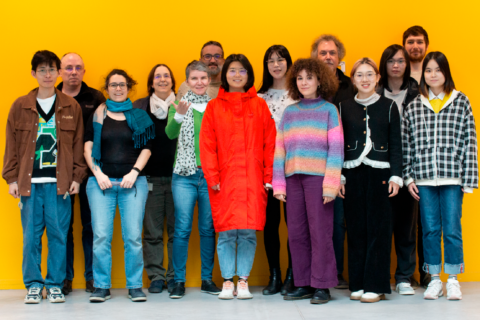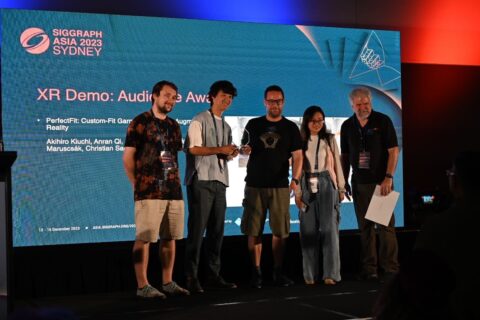Approach and perspective
The approach of the Mechanics-Energetics department is at the interface between computer science, physics and applied mathematics.
We wish to maintain a balance between interdependent activities:
- understanding the fundamental phenomena of turbulent fluid mechanics,
- tackling complex multiphysics problems coupled at large scales,
- leveraging our physical knowledge while considering data as an inherent part of modeling, experiments and simulations.
In this context, we are very open to recent developments in machine learning, which offer a powerful information processing framework that can augment our current lines of research with broad-spectrum applications in the energy, transportation, health, and environmental sectors.
Organization
The Mechanics-Energetics Department offers original and multidisciplinary research thanks to the expertise of some twenty permanent staff, researchers, teacher-researchers and engineers, organized into two complementary teams: DATAFLOT (DAta science, TrAnsition, FLuid instabiLity, contrOl & Turbulence) relying on data-augmented modeling and artificial intelligence, and studying fluid dynamics, instabilities and turbulence, and COMET (COuplages MultiphysiquEs et Transferts) focusing on the understanding of complex coupled fluid phenomena, involved in energy conversion and storage, heat transfers as well as energy efficiency optimization.
-
Proceedings/Recueil des communications
Pierre-Philippe Cortet, Éric Falcon, Mathieu Gibert, Jean-Baptiste Gorce, Marc Lefranc, et al.. Recueil des contributions de la 28e Rencontre du Non-Linéaire 2025. 28e Rencontre du Non-Linéaire 2025, Mar 2025, Paris, France. 2025, 978-2-9576145-4-7. ⟨hal-05523688⟩
-
Communication dans un congrès
Gen Wu, Nicolas Grenier, Caroline Nore. Two-fluid Compressible Flows with Multiresolution Adaptive Mesh Refinement. 12th International Conference on Multiphase Flow, May 2025, Toulouse, France. ⟨hal-05499499⟩
-
Communication dans un congrès
Nicolas Grenier, Marie-Christine Duluc. Strong interaction between a gas bubble and a free surface in a confined domain at subatmospheric pressure. 12th International Conference on Multiphase flow, May 2025, Toulouse, France. ⟨hal-05498135⟩
-
Article dans une revue
Hao Zhou, Zhongzheng Wang, Didier Lucor, Emilie Sauret. New Bayesian optimisation framework for robust multi-objective design: decoupling performance and uncertainty. Reliability Engineering and System Safety, 2026, pp.112359. ⟨10.1016/j.ress.2026.112359⟩. ⟨hal-05513238⟩
-
Article dans une revue
Rahul Sundar, Didier Lucor, Sunetra Sarkar. Sequential learning based PINNs to overcome temporal domain complexities in unsteady flow past flapping wings. Journal of Fluids and Structures, 2025, 139, pp.104421. ⟨10.1016/j.jfluidstructs.2025.104421⟩. ⟨hal-05513344⟩
-
Communication dans un congrès
Zatout Yanis, Onofrio Semeraro, Lionel Mathelin, Bataille Françoise, Adrien Toutant. Fast and accurate field reconstruction of Thermal-Large Eddy Simulation (T-LES) by Deep Learning. 31ème Congrès Français de Thermique, Institut de Thermique, Mécanique, Matériaux, May 2023, Reims, France. ⟨hal-05454994⟩
-
Article dans une revue
Abdullah Abdal, Debashis Panda, Lyes Kahouadji, Mosayeb Shams, Seungwon Shin, et al.. Three-dimensional numerical simulations of product changeover: miscible and immiscible displacements in circular tubes. International Journal of Multiphase Flow, 2026, 197, pp.105634. ⟨10.1016/j.ijmultiphaseflow.2026.105634⟩. ⟨hal-05490276⟩
-
Article dans une revue
Andrea Düll, Alexander Nies, Álvaro Echeverría de Encio, Lyes Kahouadji, Seungwon Shin, et al.. Three-dimensional effects on carbon capture in wavy falling films. International Journal of Multiphase Flow, 2026, 197, pp.105624. ⟨10.1016/j.ijmultiphaseflow.2026.105624⟩. ⟨hal-05490273⟩
-
Article dans une revue
Yanis Zatout, Adrien Toutant, Onofrio Semeraro, Lionel Mathelin, Françoise Bataille. A priori reconstruction of Thermal-Large Eddy Simulation (T-LES) by Deep Learning Reconstruction a priori de champs de Simulations des Grandes Echelles Thermiques par Apprentissage Profond. Entropie : thermodynamique – énergie – environnement – économie, 2023, 4 (3), ⟨10.21494/ISTE.OP.2023.1015⟩. ⟨hal-05454757⟩
-
Poster de conférence
Yanis Zatout, Adrien Toutant, Onofrio Semeraro, Lionel Mathelin, Françoise Bataille. Weakly supervised learning for a priori reconstruction of Thermal Large Eddy Simulations using two-point correlations Modeling of the solar receiver Methods Context Context Modeling and methods Modeling and methods Results and conclusion Results and conclusion. Congrès Français de Thermique, Jun 2024, Strasbourg, France. ⟨hal-05454986⟩






